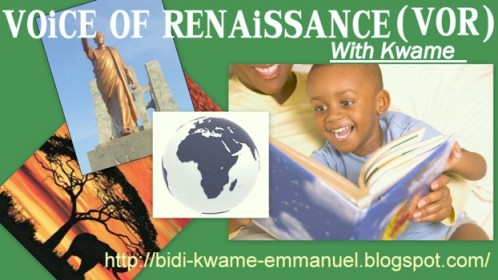
There is this malicious
journalistic practice perpetuated in Ghana and many parts of Africa which is
essentially working for African disintegration rather than unity and
integration.
How many times have you read
and heard about captions in Ghanaian media and other media houses in Africa
that reads
similar to this “Two Nigerians
and a local nabbed by Police for attempted drug trafficking”? What of this:
“One Kenyan, two Ugandans and a local caught for fraud”? Betters still: “Two
Ghanaians, three Senegalese and one Nigerian caught by Moroccan officials for
illegal migration” This raise questions whether it is the nation that is at
fault or the individual African people involved.
This practice is not limited to
just one part of Africa. In South Africa, it is not uncommon at all, for
offenders’ national identities to take priority over their individual
identities. Common “offending” nations include Zimbabwe, Kenya, Tanzania,
Uganda, Rwanda and of course, Nigeria. The headlines are intentionally or
unintentionally made to sound as if it is the nationalities of culprits which
are at fault and not the individuals themselves. In the Northern part of Africa,
the situation is reported worse, as countries (mostly in West Africa) whose
people use the region as a transit point for entering Europe, are treated with
disdain.
There is a theory in psychology
called classical conditioning, loosely rendered as learning by association. The
underlying principle is simply that, when a neutral stimulus become closely
paired with another stimulus that elicits a response, the hitherto neutral
stimulus will over time, acquire the power to evoke a response similar to the
one that already does. Putting it in the context of this article, when a
country is always associated with fraud and robbery for instance, it gets to a
point when the mere mention of that country is able to evoke the same fearful
and disgusting feeling you experience at the mention of “fraud” and “robbery”.
One African student, from
Nigeria, who has spent three years studying at the University level in Ghana,
during a private conversation with him at the recent AASU conference in Accra,
shared his impression about Ghana. In his own words he said “Ghana is cool…I
must say; only that people tend to look at me twice and shun my company at the
mention of my nationality…its bad”. Upon further enquiry as to why in his view
some Ghanaians treat him that way he replied that it’s because some few
Nigerians are fraudsters and so everybody thinks he is also one.
This is what happens when the
media houses in Africa continue to tag the few wrongdoers with their
nationalities all the time.
We often hear about free movements
of goods, services and of course people. How can Economic Community of West
African States (ECOWAS) or Southern African Development Community (SADC) and
the other economic regional blocs in Africa strengthen regionalism when we
continue to paint hostile mental imagery of one another to our citizens? How
can we finally heighten the tempo of the ambitious United States of Africa with
this attitude? It is obvious that we must change.
During a recent visit to Dr.
Audrey Gadzekpo, the current head of department of School of Communication
Studies at University of Ghana Legon, she sounded quite optimistic about the
prospect of African unity government. But she was quick to chip in the hostile
and unfriendly images fellow Africans portray of themselves to their own people
and to the outside world, as a canker that must be healed to speed up the
process of regional and continental integration.
The 2008 xenophobic attacks in
South Africa against fellow Africans must serve a timely warning for us all,
especially the media houses. Painting groom mental impressions of countries to
citizens of your country, can very well serve a fertile ground for potential
xenophobic tendencies. The Rwandan genocide of 1994 where about 800,000 people
lost their lives in a matter of 100 days, due to an unguarded remark by a
journalist, is another point of reference worthy of study by all Africans.
Dr. Nkrumah realized long time
ago that, for a United States of Africa (USA) to see the light of the day,
African people need to learn and master cooperative living in the spirit of
harmony and tolerance. In fact, he boldly walked the talk, when he defied all
the rife internal criticisms to marry an Egyptian woman instead of a Ghanaian.
Let us embrace the things that
bind us together as Africans with common destiny and shun practices that are
likely to “put a knife on the things that hold us together”. We cannot afford
to fall apart, as the Igbo people did with the advent of the White men in
Chinua Achebe’s tragic novel “Things Fall Apart”.
The next time we hear of a
caption that reads “Two Nigerians” and one local nabbed by Police for robbery”,
challenge the headline. For the sake of African unity, it should rather read as
“Egbuefi Ijioka, Okwonko Izeama and Kwesi Yeboah nabbed by Police for robbery”.
Better still, it can simply be “Three people nabbed by Police for robbery”.
